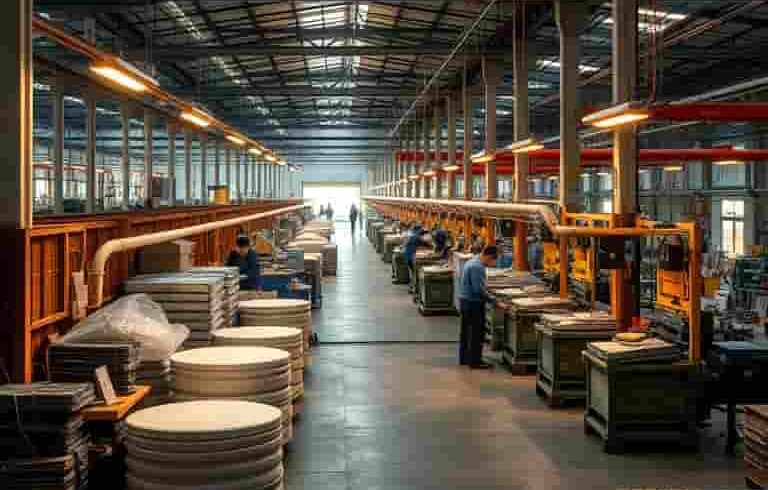- About Us
- Legal Services
- Family Law
- Property
- Marriage
- Immigration
- Contact
- Payments
These are the penalties under the Factory Act when you break the law. We have added the infractions of the law below with the fines. Note that these are rewrites so don’t bookmark this page as this is for references purposes only. The Thai courts only accept the original Thai version of the law. Likewise also see the articles that we wrote on supervision of the factory as well as the running a factory in Thailand as well. Lastly we also wrote a number of articles on the business license Thailand process as well as the business accounting service which we offer.

Any person who violates or fails to comply with the ministerial rules under Section 8 (1), (2), (3), (4), (5), or (8), or announcements by the Minister based on these rules, is liable to a fine not exceeding 200,000 Baht.
These are the Sections that is is referring to.
The following penalties have a smaller fine or only 20,000 THB.
Violators of the ministerial rules under Section 8 (6) or (7), or related announcements, face a fine not exceeding 20,000 Baht.
Failing an inspection result under Section 9 may result in imprisonment for up to two years, a fine not exceeding 200,000 Baht, or both.
• Section (9): An appointed individual may inspect the factory or machines and report findings, substituting for official duties.
Engaging in a Group 2 factory business without notifying the authorities under Section 11 may lead to imprisonment for up to six months, a fine not exceeding 50,000 Baht, or both.
This is where there is incorrect or incomplete notification of a Group 2 factory business, or failure to comply with Section 11 (2) and (5) or Section 33, results in a fine not exceeding 20,000 Baht.
This is where you are operating a Group 3 factory without a permit under Section 12 (1) or establishing a factory without a permit under Section 12 (2) may lead to imprisonment for up to two years, a fine not exceeding 200,000 Baht, or both. For factories regulated by announcements under Section 32 (1), penalties can be increased to a maximum of four years imprisonment or a 400,000 Baht fine.
Those holder of permits who fail to comply with Section 13 (1) or (2), Section 19, Section 28, or Section 33 may be fined up to 20,000 Baht.
Expanding a factory without the necessary permit under Section 18 can result in imprisonment for up to two years or a fine not exceeding 200,000 Baht, or both. For regulated types of factories under announcements in Section 32 (1), penalties increase to four years imprisonment or 400,000 Baht fine.
Likewise failing to comply with Section 23, Section 24, or Section 25 may lead to a fine not exceeding 5,000 Baht.
Where is non-compliance with Section 34 (1) in factory operations can incur a fine not exceeding 20,000 Baht.
Continuing factory operations after an order to cease may result in imprisonment for up to two years, a fine not exceeding 200,000 Baht, or both, plus a daily additional fine of 5,000 Baht until compliance is achieved. Architects or engineers who continue working in a non-compliant factory are subject to the same penalties. Workers present during violations may be presumed accomplices but may receive reduced penalties based on various factors.
Obstructing or failing to assist authorities under Section 35 can lead to imprisonment for up to one month or a fine not exceeding 20,000 Baht, or both.
Failing to comply with orders from authorities under Section 37 (1) may result in imprisonment for up to one year, a fine not exceeding 100,000 Baht, or both, with an additional daily fine of 5,000 Baht for continued non-compliance.
Reactivating machinery bound and stamped by authorities under Section 37 (2) may incur imprisonment for up to one year, a fine not exceeding 100,000 Baht, or both.
Obstructing a person assigned by the Permanent Secretary from executing orders under Section 42 can lead to imprisonment for up to one year, a fine not exceeding 100,000 Baht, or both.
Causing damage to an order to stop factory operations or close a factory may result in imprisonment for up to six months or a fine not exceeding 50,000 Baht, or both.
Architects or engineers working on a factory committing an offence will face the same penalties as the factory operator unless they prove ignorance of the offence. The Permanent Secretary will notify relevant boards of such incidents.
Repeat offenders may face increased penalties, with a minimum of one-third additional imprisonment or half for fines.
In cases of offences committed by partnerships, companies, or other juristic persons, responsible directors or managers are also liable for penalties unless proven otherwise.
Individuals residing near an offending factory are considered injured parties under the Criminal Procedure Code.
Committees for case processing will be appointed by the Minister, consisting of three legal scholars for a term of two years, with provisions for fines as an alternative to prosecution.
Transitory Provisions
Pending applications and permissions under previous laws are deemed valid under this Act, with the Grantor authorized to amend as necessary.
Permits for engineering in factory businesses issued prior to this Act will remain valid until expiration, and existing factory establishment permits will be recognized under this Act.
Previous ministerial rules and announcements remain valid unless conflicting with this Act’s provisions.
Lastly we have written a number of articles on a number of issues with business. These include the articles on the starting a business in Thailand as well as business tax Thailand. Likewise there is also the starting a business in Thailand as a foreigner if you are a foreigner starting a factory production business in Thailand.
The information contained in our website is for general information purposes only and does not constitute legal advices. For further information, please contact us.
